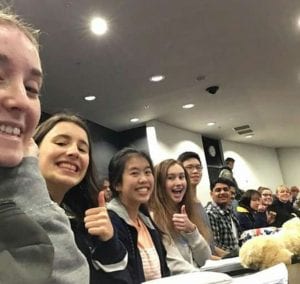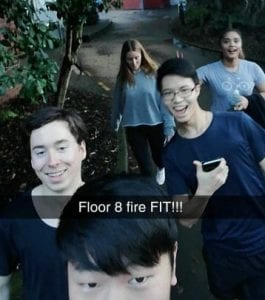For many entering university for the first time, you arrive at the age of 17, 18, 19ish. You come in with many preconceptions about university, from all sources. Some of these are correct, while others are not quite accurate. Today’s blog is gonna tackle a few of these misconceptions, based on my own experiences and people I’ve interacted with over the year so far. So if/when you do come to uni, you’ll have another perspective on what things are like 🙂
Uni to Highschool Transition
University learning IS NOT just like the ‘big step up’ to NCEA Level 1, or from level 1 to 2, or 2 to 3. It’s a completely different teaching style, primarily lecturing, for many courses. The typical layout of my SCIENCE based course is 6 x 1-hr lectures and 1 x 3-hr Lab session per fortnight. I have four papers per semester in the first year of my course. This adds up to 36 hrs contact time per fortnight, or 18 hrs per week. When comparing this to a typical week at high school, with 5 days of 5 hrs teaching time, the time spent at University per week (18 hrs) is less than the contact time at school (25 hrs) per week.
Don’t let this fool you though, as those hours at school are very supported, in the fact that there is a teacher on hand for maybe 25 students. Compare this to an example of one of my typical courses, where there is a single lecturer for 1200 students. There is no way that every student will get one on one time with the lecturer, save for perhaps half a minute. (There are office hours, and often senior/graduate students available for support, but the point being made is that due to sheer numbers, not everyone can be supported as well as you might’ve been in high school).
Deadlines are deadlines. A medical certificate from a doctor is to university as a signed note from a parent was at high school. There’s very little opportunity for resits, resubs or extensions of deadlines in university (well at least, a lot less than there might’ve been in highschool). Time management and planning is an essential skill at uni, where you have to juggle all kinds of schedules and make them work, as opposed to a single timetable at school.
Really, the key thing I would have to say is that:
University learning is primarily self directed and self managed, that means that it’s pretty much all on YOU to succeed.
Change of Plans
More often than you might think, university degrees aren’t always a straight path from entry to graduation. This is especially true in the course I’m taking – Biomedical Science/ Health Science, with the intention of getting into Medicine. By the numbers alone, ~1250 of the initially ~1500 strong cohort will have to consider different options by the end of the year.
I also know a fair number of people who enter a degree with some expectation around what it’s like, only to realise halfway through a semester that it was nothing like what they thought- changing majors or degrees soon after. It may be wise to have ‘backup’ plans in case things do not quite flow with your pre-envisioned plan.
Making friends
Talking to mates from universities all over the country (and reading multiple UoA: Meaningful Confessions), there seems to be a common issue of the struggle of making friends. Now, you might be thinking that with the tens of thousands of people at university, the thousands in first year, and the hundreds of people in the course you’re taking- surely it’s not that difficult to snag a couple of friends. However, ironically enough, it’s the sheer number of students that can make that personal relationship aspect of friendship more challenging. Lectures aren’t the ideal places to make friends, with only maybe 10mins between adjacent lectures to have short yarns with those around you – before having to split up to different lectures after the hour is done.
Smaller groups such as in Labs and Tutorials are better places to get to know people, with closer to school class sizes of ~30. Still, having to reach out and make a real effort to create friendships is something that takes a bit of courage to do.
Treasure your high school friendships, especially those really special ones. Invest time and effort to keep them alive, you may not appreciate how valuable they actually are until you lose them.
Get out there, talk to mates about their university experiences, about their courses and general life at university. You’ll learn a heck of a lot.
Who knows, maybe I’ll see you round UoA sometime in the future!




Hey Daniel!
I had a few questions if you don’t mind 🙂
1. Why did you choose Auckland uni over Otago for getting into med?
2. What hall are you in and what do you think of it?
3. What subjects did you do at school + schol subjects ?
4. Is a 15 minute away hall from city campus (Grafton 1st year) too far in terms of needing to study and utilising time etc ?